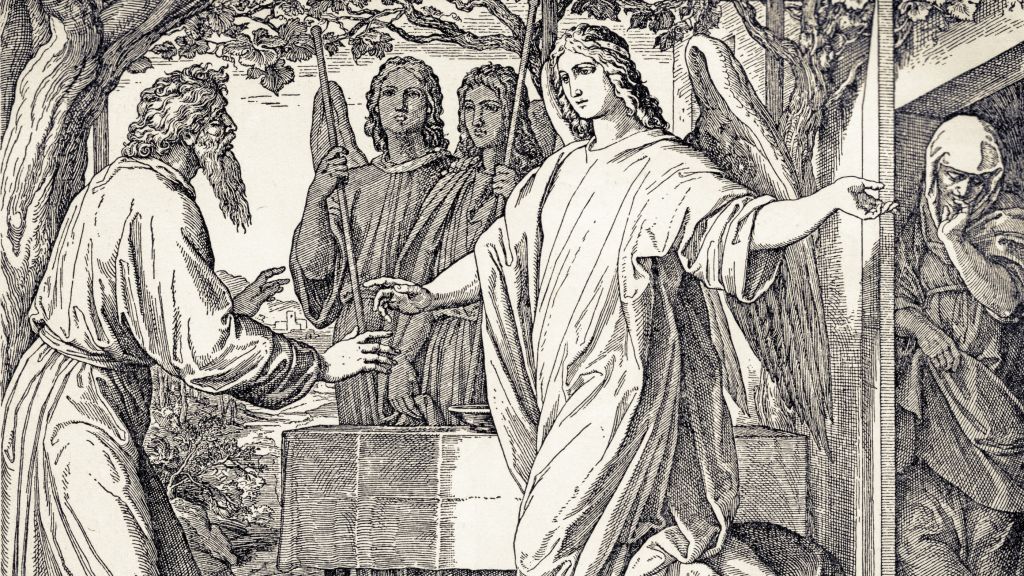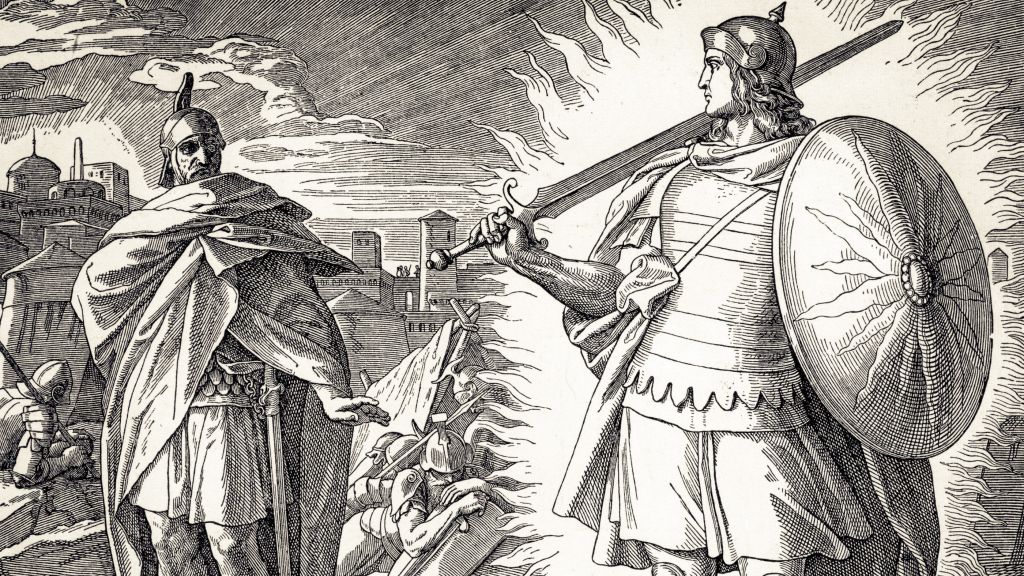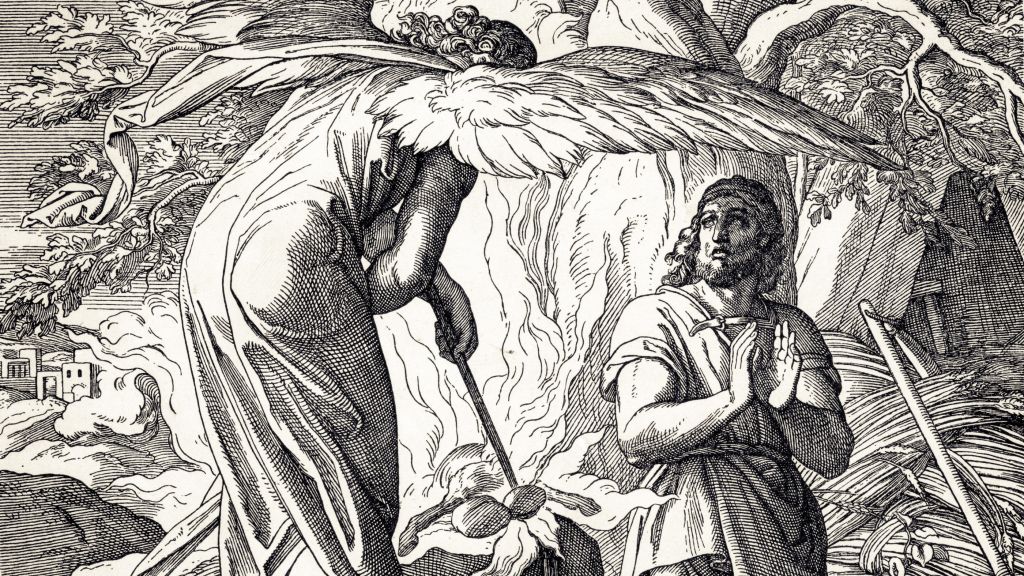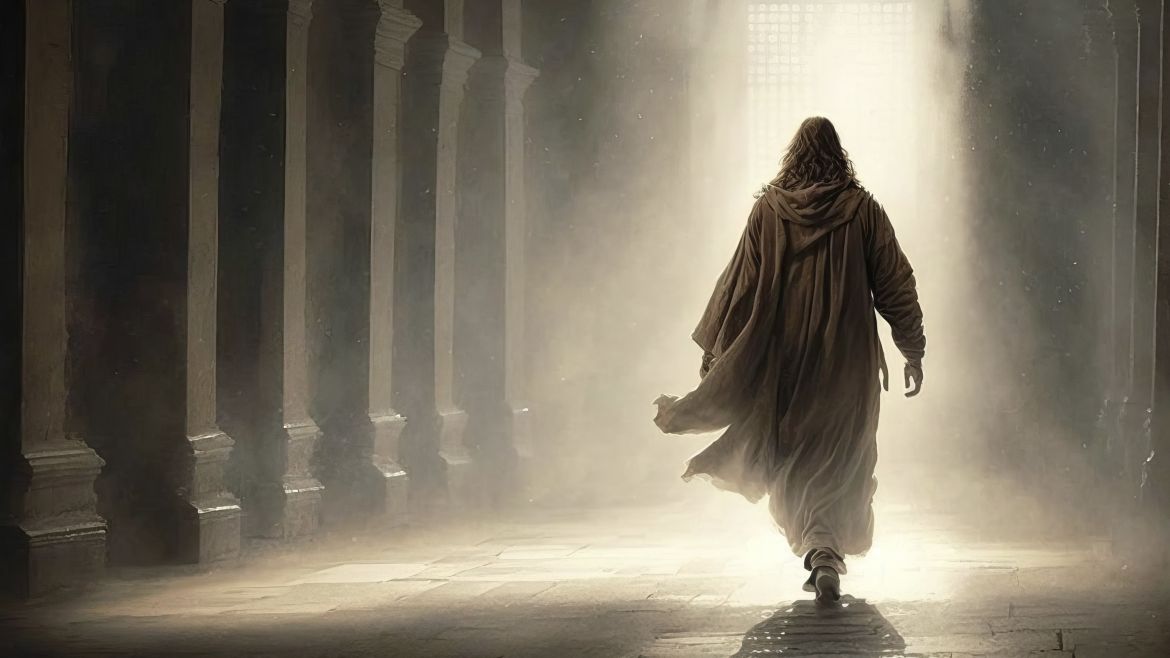– Written by pastor Llew Edwards –
There is a principle in leadership theory that says be open to the possibility that help will often come from an unexpected place. Particularly for those of us who walk by faith, this has often come true. And when it happens, we marvel at how God is involved in our lives. There are many places in the Bible where The Stranger turns up. The following are some of these places.
Abraham and the Stranger who turned up
The situation is dire. His nephew is living in a dangerous city and apparently doing well but how easily it could all turn out for the worse. Abraham is sitting just inside his hillside tent avoiding the heat of the afternoon, maybe mulling over his fears, when suddenly three “men” are at the entrance to his tent. [The story is in Genesis 18.]

He does not know who they are but he immediately shifts into urgent hospitality mode and after the meal and some news about an impossible birth in his family, the men head off in the direction of Sodom where his nephew lives. Abraham goes with them – maybe to help with directions.
It is not clear he knows who these men are – the writer of the text tells us in the very first verse that the leader of the three is the LORD [meaning Yahweh – God’s personal name] while Abraham calls Him Lord [a very respectful way of addressing someone] even up to the end of the chapter. One wonders if Abraham ever realised who these three “men” were. They clearly are not human. The first is Yahweh Himself and the other two are angels – see the next chapter. What strangers these are!
Hagar and the Stranger who keeps turning up
This story is in Genesis 16. Another dire situation. Hagar has been treated harshly by Sarai. The word used here to describe her treatment is the same word used to describe the Egyptian mistreatment of the Israelites slaves [See Genesis 15:13].
Her treatment is so bad that she simply flees into the wilderness and is alone and in destress by a spring she has found. There a stranger turns up who Hagar addresses as the angel of Yahweh. He tells her to go back and submit to Sarai but assures her that her offspring will be so blessed that they cannot be numbered.
She recognises who this angel is and does something no other person in all the Old Testament, male or female, does – she gives him a name – the God of seeing. Why? Hagar rightly understands the purpose of the stranger, for she said, “Truly here I have seen him who looks after me.” [Genesis 16:13]
Jacob and the Stranger who keeps turning up
This incident is about Jacob – the deceiver. It is found in Genesis 32. He has got himself into a right mess. His brother who he crooked out of his birth right is on his way with 400 soldiers. He does his best to think how he might appease Esau…
His main strategy is to shower Esau with repeated waves of expensive gifts. As well he sends his immediate family onto the other side of the river Jabbok and he then remains alone to face the wrath of his brother. It is dark – he dares not light a fire – he is in fear and anguish.

Suddenly a man turns up and Jacob wrestles with him having no idea who it is. The stranger asks his name and Jacob is forced to say “Deceiver” [Jacob] but the stranger will not give his name. Jacob simply knows that he has faced a divine being – Elohim.
We don’t have all the details. I assume, in the confidence from the encounter with the stranger Jacob brought his family back over the river and led them to Esau all the while bowing before him. The stranger blesses him.
Joshua and the Stranger who keeps turning up
Before Israel enters Canaan Yahweh makes a promise to them about a stranger who will guard them. “Behold, I send an angel before you to guard you on the way and to bring you to the place that I have prepared. Pay careful attention to him and obey his voice; do not rebel against him, for he will not pardon your transgression, for my name is in him.” [Exodus 23:20-21]
He is identified only by the authority he has and that he has Yahweh’s name in him. [This phrase about ‘Yahweh’s name in him’ is worth much study – no time for that here.]
So Joshua has brought Israel over the Jordan – they are in Canaan. Yippee – but now they face the powerful city of Jericho. Joshua is wandering in the night pondering what strategy they might use to conquer this city and when the angel would come to help. Suddenly he sees a “man” standing before him with a raised sword. Joshua calls out asking if the man is friend or foe. [The story is in Joshua 5:14-15.]

And he said, “No; but I am the commander (ruler) of the army of the LORD. Now I have come.” And Joshua fell on his face to the earth and worshiped and said to him, “What does my lord say to his servant?” And the commander of the LORD’S army said to Joshua, “Take off your sandals from your feet, for the place where you are standing is holy.” And Joshua did so.
The passage packs many things:
First, that line “Now I have come” – I imagine Superman standing there with a huge smile on his face – “Did someone call?”
Secondly, the word “Captain” or “Commander” of the lord’s host/army – some commentators argue that this is best translated “Ruler”.
And thirdly, the order to take his sandals off – he is on holy ground! Same wording as the Moses and the burning bush story [Exodus 3:5] – tells us that the stranger who keeps turning up is none other than God Himself.
Israel, far from God – confronted by the Stranger who keeps turning up
Read it with me in the book of Judges: “Now the angel of the LORD went up from Gilgal to Bochim. And he said, “I brought you up from Egypt and brought you into the land that I swore to give to your fathers. I said, I will never break my covenant with you, and you shall make no covenant with the inhabitants of this land; you shall break down their altars.’ But you have not obeyed my voice. What is this you have done?” [Judges 2:1-2]
First, who is this stranger? What is his name? Two clues – first when the angel says “you have not obeyed my voice” is he not identifying with the promised guardian of the Exodus 23:20-21 above?
Secondly, the angel [divine being] says “I brought you up from Egypt”. Does Jude help us when in his epistle he writes “Jesus, who saved a people out of the land of Egypt” [Jude 1:5]?
Thirdly, the stranger is clearly concerned when God’s people turn from him. I think I know who the stranger is!
Gideon, the weakest in Israel gets help from the Stranger who keeps turning up
Judges 6 records a number of interactions between Gideon and the stranger who has turned up. The writer of the story clearly identifies the presence of a divine being – the angel of the LORD who tells [v. 12] Gideon that the LORD is with him. Gideon’s response [v. 13, my paraphrase] “No he’s not with us. Look at the mess we are in. Where are all his great deeds that our parents tell us about – he has abandoned us.”

The LORD tries again “…do not I send you?” [v. 14]. Gideon’s response “I’m nobody.” [v. 15]
Again, the LORD tries “But I will be with you…” [v. 16] Gideon’s response is “…show me a miracle.” [v. 17]
The LORD does a miracle and in verses 21 & 22 Gideon is shocked into understanding that the stranger who turned up was God himself.
There are many more examples of the stranger who turns up in the midst of our needs. The New Testament writers use all the manifestations in the Old Testament to describe Jesus, for example “the Word” of “the manifestation of the name and the glory” (in the Gospel of John), “Israel’s deliverer” (in the Epistle of Jude), “the Rock [that] was Christ” (in Paul’s Epistle to the Corinthians) etc.
Easter and the Stranger who keeps turning up
But now let us turn to the time of our greatest need. The prophet Isaiah [25:7-8] describes it as a time when the shroud of death has covered all peoples and they are without hope. Isaiah [60:2] describes this as a time when a deep darkness covers the land and a thick darkness enshrouds the people. But the verse goes on “but the LORD will arise upon you, and his glory will be seen upon you.”
At that time a humble unrecognised couple in a stable give birth to a child who no one recognises apart from a few strangers from far away East. This stranger grew up unrecognised by the rulers of Israel. He came to his own and they did not recognise him [John 1:10-11].
He tries to tell them but that simply increases their antagonism.
In a way you can’t blame them – the Jews are shocked that God could be so lowly and treated so badly and still be God. They knew that God turned up “looking” human in the Old Testament. That was one thing… He was always powerful, but “being” human and lowly and gentle was another matter.

At Jesus’ trial the Jews were “were apoplectic with rage at what they imagined was the ultimate in blasphemy. They were judging him: the idea that he would judge them seemed preposterous.” [John Lennox, Against the Flow]
But Jesus needed to be swallowed up by death and he could only do that as an actual human. All the other appearances by the Stranger were only appearances. This time it was for real – He became incarnated so that He could taste death for every man.
Hebrews 2:14-15 says
“Since therefore the children share in flesh and blood, He himself likewise partook of the same things, that through death He might destroy the one who has the power of death, that is, the devil, and deliver all those who through fear of death were subject to lifelong slavery.”
So on Good Friday [good for us – bad for Him], His own people killed Him and He submitted willingly to the domain of death. Then, in death, He lost access to all that Sabbath gave humanity… But just after sunset He rose on what we call Easter Sunday.
This is the Stranger who keeps turning up – for you and me.
He went away but is coming back again – this time to take us all home.
Come, Lord Jesus!




